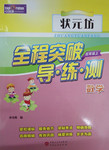ÌâÄżÄÚÈĘ
ĄŸÌâÄżĄż¶ÌÎĞĎí
ŒÙ¶šÓąÓïżÎÉÏÀÏÊŠÒȘÇóÍŹŚÀÖźŒäœ»»»ĐȚžÄŚśÎÄ,ÇëÄăĐȚžÄÄăÍŹŚÀĐŽ”ÄÒÔÏÂŚśÎÄĄŁÎÄÖĐčČÓĐ10ŽŠÓïŃÔŽíÎó,ĂżŸäÖĐŚî¶àÓĐÁœŽŠĄŁĂżŽŠŽíÎóœöÉ挰һžö”„ŽÊ”ÄÔöŒÓĄąÉŸłę»òĐȚžÄĄŁ
ÔöŒÓ:ÔÚȱŽÊŽŠŒÓÒ»žö©ŚÖ·ûșĆ(ĄÄ),ČąÔÚÆäÏÂĂæĐŽłöžĂŒÓ”ÄŽÊĄŁ
ÉŸłę:°Ń¶àÓà”ÄŽÊÓĂбÏß(\)»ź”ôĄŁ
ĐȚžÄ:ÔÚŽí”ÄŽÊÏ»źÒ»șáÏß,ČąÔڞÎÊÏÂĂæĐŽłöĐȚžÄșó”ÄŽÊĄŁ
ŚąÒâ: 1.ĂżŽŠŽíÎóŒ°ÆäĐȚžÄŸùœöÏȚÒ»ŽÊ;
2.Ö»ÔÊĐíĐȚžÄ10ŽŠ,¶àŐß(ŽÓ”Ú11ŽŠÆđ)Č»ŒÆ·ÖĄŁ
Mr. Smith, our English teacher, works hard. Every day, he spends too much time with his work. With little sleep and hardly any break, so he works from morning till night. Hard work have made him very ill. Ą°He has ruined his healthy. We are worried about him.Ą± That is which other teachers say. Yesterday afternoon, I paid visit to Mr. Smith. I was eager to see him, but outside her room I stopped. I had to calm myself down. Quietly I step into the room. I saw him lying in bed, looking at some of the picture we had taken together. I understood that he missed us just as many as we missed him.
ĄŸŽđ°žĄż
ĄŸ1ĄżwithĄúon
ĄŸ2ĄżÈ„”ôso
ĄŸ3ĄżhaveĄúhas
ĄŸ4ĄżhealthyĄúhealth
ĄŸ5ĄżwhichĄúwhat
ĄŸ6ĄżŒÓa
ĄŸ7ĄżherĄúhis
ĄŸ8ĄżstepĄústepped
ĄŸ9ĄżpictureĄúpictures
ĄŸ10ĄżmanyĄúmuch
ĄŸœâÎöĄż
ÊÔÌâ·ÖÎöŁș±ŸÎÄœČÊöÁËŚśŐßÈ„żŽÍûĐÁÇÚ而śÀÍÀÛčę¶È¶űČĄ”č”ÄÀÏʊʱŁŹżŽ”œÀÏÊŠÔÚČĄŽČÉÏżŽŚĆÎÒĂÇŐŐÆŹŁŹĂś°ŚÁËÀÏÊŠșÍѧÉúËŒÄîÀÏÊŠÒ»ŃùÔÚËŒÄîѧÉúĂÇĄŁ
ĄŸ1ĄżwithĄúon żŒČéœéŽÊĄŁ č̶š¶ÌÓïŁșspend Ą..on ĄĄ°ŃĄŁĄŁĄŁĄŁ»š·ŃÔÚĄŁĄŁĄŁĄŁĄŁŁŹËùÒÔÓĂonĄŁ
ĄŸ2ĄżÈ„”ôso żŒČéÁŹŽÊĄŁ ÒòÎȘwithout¶ÌÓïŚö”ÄÊÇ°éËæŚŽÓïŁŹșóĂæžĂžúŒò”„ŸäËùÒÔČ»ĐèÒȘÓĐÁŹŽÊsoŁŹËùÒÔÈ„”ôsoĄŁ
ĄŸ3ĄżhaveĄúhas żŒČ鶯ŽÊÊ±ÌŹĄŁżŒČéÖśÎœÒ»ÖÂŁŹŸäŚÓÖśÓïÊÇhard workŁŹÊÇ”„Ê꣏ËùÒÔÎœÓï¶ŻŽÊÓŠÓĂ”„ÊęĐÎÊœŁŹčÊÓĂhasĄŁ
ĄŸ4ĄżhealthyĄúhealthżŒČéĂûŽÊĄŁÒòÎȘÇ°ĂæÊÇÎïÖśŽúŽÊhisŁŹÓŠžĂĐȚÊÎĂûŽÊŁŹ¶űhealthyÊÇĐÎÈĘŽÊŁŹčÊÓĂhealth
ĄŸ5ĄżwhichĄúwhatżŒČéčŰÏ”ŽÊĄŁŐâÊÇÒ»žö±íÓïŽÓŸäŁŹwhichŁșÄÄÒ»žöČ»șÏÊÊŁŹžÄłÉwhatŁŹÊÇwhatÒę”Œ±íÓïŽÓŸäŁŹwhatÔÚŽÓŸäÖĐŚöÖśÓïŁŹÒâÎȘŁșĄŁĄŁĄŁ”Ä»°ŁŹÓĂwhatĄŁ
ĄŸ6ĄżŒÓa żŒČéčÚŽÊĄŁč̶š¶ÌÓïŁșpay a visit to °Ę·ĂĄŁĄŁĄŁŁŹčÊŒÓaĄŁ
ĄŸ7ĄżherĄúhis żŒČéŽúŽÊĄŁ±ŸŸäÓŠžĂÊÇÔÚÔŒșČŃ·ÀÏÊŠ”Ä·żŒäÍâĂæŁŹÔŒșČŃ·ŁŹÄĐĂûŁŹËùÒԞijÉhisŁŹÓĂhisĄŁ
ĄŸ8ĄżstepĄústepped żŒČ鶯ŽÊÊ±ÌŹĄŁÇ°ĂæÓĐʱŒäŚŽÓïyesterday afternoonŁŹËùÒÔÓĂsteppedĄŁ
ĄŸ9ĄżpictureĄúpictures żŒČéĂûŽÊĄŁsome of the + žŽÊęĂûŽÊŁŹÓĂpicturesĄŁ
ĄŸ10ĄżmanyĄúmuchżŒČéĐÎÈĘŽÊĄŁ č̶š¶ÌÓï as much as șÍĄÍŹŃù”ŰŁŹĐȚÊζŻŽÊ±íłÌ¶ÈŁŹÓĂmuchĄŁ

 ŚŽÔȘ·»È«łÌÍ»ÆÆ”ŒÁ·ČâÏ”ÁĐŽđ°ž
ŚŽÔȘ·»È«łÌÍ»ÆÆ”ŒÁ·ČâÏ”ÁĐŽđ°ž